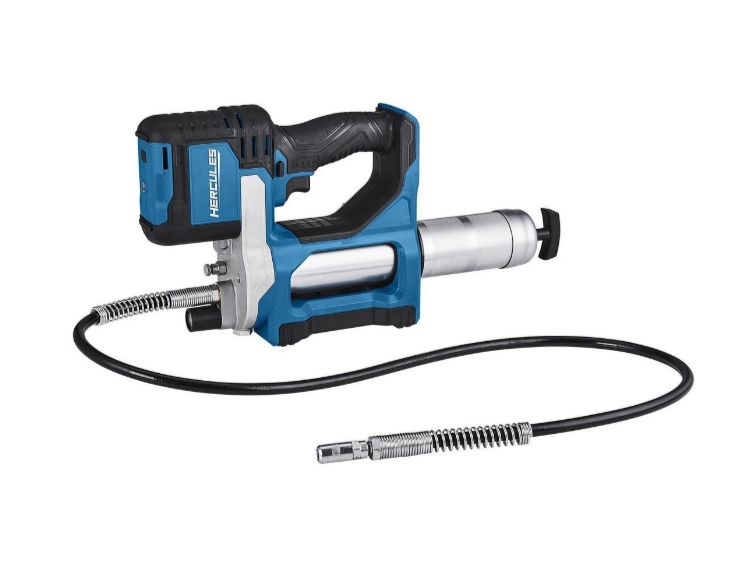
HERCULES 20V Cordless Variable Speed Grease Gun – Tool Only
- The HERCULES™ 20V Cordless Grease Gun delivers up to 5 oz./min. of grease at 10,000 PSI with a variable speed control for smooth, precise and continuous grease flow. The 48 in. flex hose with anti-kink spring guards delivers maximum reach for lubricating hard to reach fittings in automobiles, RVs, construction equipment, and agricultural equipment. The 14.5 oz. stainless steel barrel cartridge with non-flip follower accepts cartridge or bulk grease. Includes built-in hose and coupler storage.
- High-performance industrial strength motor has variable speed control for flow rates up to 5 oz./min.
- 10,000 PSI max for high pressure output for thorough packing
- 14.5 oz. high capacity stainless steel barrel accepts cartridge or bulk grease
- 48 in. flex hose with anti-kink spring guards for maximum reach
- Ergonomic grip with shoulder strap mounts for easy transport
- All metal drivetrain for added durability and extended tool life
- No-mar foot design protects surfaces
- Accessory port for adding bulk filler nipple
- LED light for dark workspaces
- Shoulder strap included
$139.99
I still remember the day my trusty old grease gun finally gave up on me. It was a Tuesday afternoon, and I was halfway through maintaining my tractor when the thing just stopped working. There I was, covered in grease, parts disassembled everywhere, and suddenly without the most crucial tool for the job. After years of faithful service, my bargain-bin special had finally surrendered to the inevitable forces of wear and tear.
That unexpected failure sent me on a journey I wasn’t planning to take—a deep dive into the world of quality grease guns. And let me tell you, it’s been eye-opening! After countless hours of research, conversations with mechanics, and hands-on testing, I’ve become somewhat of an unlikely expert on the subject. When I eventually landed on the Hercules Grease Gun, I realized I’d found something special that deserved proper documentation. So here we are—the guide I wish I’d had from the beginning.
Whether you’re a professional mechanic, a farmer with equipment to maintain, or just a weekend warrior who likes to keep things running smoothly, choosing the right grease gun is essential for extending the life of your valuable machinery. It’s one of those tools where quality truly matters, and cutting corners ultimately costs you more in the long run.
So grab a cup of coffee and settle in. I’m about to share everything I’ve learned about Hercules Grease Guns—what they are, how they work, and why they might be the perfect addition to your toolbox.
What Exactly Is a Hercules Grease Gun and Why Should You Care?
Before we dive into the specifics of the Hercules brand, let’s talk about what a grease gun actually does. At its core, a grease gun is a simple but ingenious tool designed to apply lubricant to specific points on machinery—usually through grease fittings (also called “zerks”). These fittings are found on virtually every piece of heavy machinery, many automobiles, and countless other mechanical devices that have moving parts requiring lubrication.
The humble grease gun might not look impressive sitting on a workbench, but it’s one of those unsung heroes that keeps our mechanical world turning. Regular lubrication prevents metal-on-metal contact, reduces friction, protects against wear, and extends the life of expensive equipment. In many cases, a properly greased machine can last years longer than one that’s neglected.
The Hercules Grease Gun, specifically, is manufactured by Harbor Freight Tools, a company known for offering affordable tools to DIYers and professionals alike. Positioned as a higher-quality option in their lineup, the Hercules brand represents Harbor Freight’s push to compete with more premium tool manufacturers.
In my journey through grease gun territory, I’ve come to appreciate that the Hercules stands in an interesting middle ground—it’s more robust than budget options but doesn’t carry the sometimes eye-watering price tag of certain professional-grade tools. And that’s precisely why it deserves a closer look.
How Does the Hercules Grease Gun Actually Work?
The operation principle of the Hercules Grease Gun is beautifully straightforward, which is part of its charm. At its most basic level, it works by creating pressure that forces grease through a nozzle and into whatever fitting you’re targeting.
The main components include:
- A cylinder that holds the grease
- A plunger mechanism that creates pressure
- A hose or rigid tube for delivery
- A coupler that connects to grease fittings
When you operate the gun, either by squeezing the trigger (in pistol-grip models) or by pumping the handle (in lever-action versions), you’re essentially compressing the grease and forcing it through the delivery system. It’s simple physics at work—applying force to move a semi-solid material through a confined space.
What separates the Hercules from lower-quality alternatives is the precision of its components and the quality of its construction. The barrel threads are clean and precise, the seals are robust, and the overall build quality feels substantial in your hands. These seemingly small details make a significant difference when you’re in the middle of a maintenance job.
In my early days with the Hercules, I was particularly impressed by how smoothly the mechanism operated compared to my previous gun. There’s less fighting with the tool and more focus on the actual task at hand. And when you’re underneath a piece of farm equipment on a hot summer day, that efficiency is worth its weight in gold.
The Different Hercules Grease Gun Models: Manual, Pneumatic, or Battery-Operated?
One of the first decisions you’ll need to make is which type of Hercules Grease Gun suits your needs. They come in three primary varieties, each with its own set of advantages:
Manual Hercules Grease Gun
The manual version is the classic workhorse—reliable, straightforward, and never needing a power source. It comes in two sub-types:
- Lever-action: Requires two hands to operate but generally delivers more pressure per stroke.
- Pistol-grip: Allows one-handed operation, which is handy when you’re in tight spaces.
I started with the lever-action manual model, and it’s been remarkably dependable. There’s something satisfying about the mechanical simplicity—no batteries to charge, no air compressor needed. Just you and the tool, getting the job done. For occasional use or as a backup, the manual version is hard to beat.
Pneumatic Hercules Grease Gun
If you already have an air compressor in your shop, the pneumatic Hercules model offers excellent power and efficiency. These tools harness air pressure to deliver grease consistently without the fatigue that can come from manual operation.
The pneumatic version shines when you have multiple grease points to hit in a single session. The continuous operation without hand fatigue makes big jobs go much faster. The tradeoff, of course, is that you’re tethered to an air compressor and hose, which limits mobility somewhat.
Battery-Operated Hercules Grease Gun
The newest addition to the Hercules lineup, the battery-operated model combines power with portability. Operating on the same battery platform as other Hercules cordless tools, it delivers impressive pressure without requiring manual effort or an air hose.
After eventually adding the 20V lithium-ion battery-operated model to my collection, I’ve found it particularly useful for field repairs and maintenance tasks away from the shop. The freedom to move around without constraints is invaluable when working on larger equipment or in remote locations. The battery-operated Hercules Grease Gun has dramatically reduced the time I spend on routine maintenance tasks while increasing the thoroughness of my work.
Each type has its place, and many serious mechanics or equipment owners eventually end up with more than one. I’ve found that having both a manual and a battery-operated version covers virtually all my needs.
Key Features That Make the Hercules Grease Gun Stand Out
What exactly separates the Hercules from both cheaper alternatives and more expensive competitors? Several features are worth highlighting:
Pressure Output
The Hercules models typically deliver between 6,000 and 10,000 PSI, depending on which version you select. The battery-operated model can push up to 10,000 PSI, which is impressive and suitable for even heavy-duty applications.
This pressure capability means the Hercules can handle tough grease fittings that have hardened over time or are particularly stubborn. I’ve encountered old agricultural equipment where lesser guns simply couldn’t push grease through the fittings—the Hercules powered through without complaint.
Durability and Construction
One immediately noticeable aspect of the Hercules is its solid construction. The barrel is made from heavy-duty steel rather than the thinner material found in budget models. The handle (on manual versions) feels substantial, and the overall build quality suggests a tool designed for years of service.
The seals and O-rings—often the first points of failure in lesser grease guns—are made from high-quality materials that resist breakdown from contact with different grease formulations. These seemingly minor components make a major difference in longevity.
Ergonomics
The Hercules designers clearly spent time thinking about how the tool feels in hand during extended use. The pistol-grip models feature comfortable grips with texturing that provides purchase even when your hands are inevitably greasy.
The battery-operated version balances its weight surprisingly well, reducing fatigue during longer jobs. After an hour of greasing various implements on my property, my wrists and hands thanked me for investing in a tool designed with the user in mind.
Capacity and Loading Options
With a standard 14oz capacity, the Hercules holds enough grease for most maintenance sessions without frequent reloading. The gun accepts grease in three ways:
- Standard grease cartridges
- Suction loading from a bulk container
- Bulk loading with a filler pump
This flexibility has proven invaluable in my experience. I typically use standard cartridges for convenience, but being able to load from bulk containers saves money when I’m doing extensive maintenance on multiple pieces of equipment.
Where Can You Buy a Hercules Grease Gun?
Since Hercules is a Harbor Freight brand, the primary place to purchase these grease guns is through Harbor Freight stores or their website. With over 1,000 locations across the United States, most people have a Harbor Freight within reasonable driving distance.
I initially purchased mine during one of their frequent sales, which offered an additional discount on an already reasonable price. If you’re planning to buy one, it’s worth signing up for their email list or checking their flyer to catch these promotional periods.
Beyond the official Harbor Freight channels, you might occasionally find Hercules Grease Guns through:
- Online marketplaces like eBay or Amazon (though be cautious of counterfeits)
- Secondary sellers who specialize in tools
- Local tool swap meets or used tool sales
In my experience, buying directly from Harbor Freight provides the best value and ensures you’re getting an authentic product with warranty coverage. The peace of mind is worth bypassing potential savings from third-party sellers.
Price Point: Is the Hercules Grease Gun Worth the Investment?
Let’s talk dollars and cents—always an important consideration when adding to your tool collection.
The Hercules Grease Gun sits in what I’d call the “mid-premium” range. It’s not the least expensive option on the market, but it’s far from the most costly. Here’s a general price breakdown as of my last check:
- Manual Lever-Action: $39.99-$49.99
- Pistol-Grip Manual: $44.99-$54.99
- Pneumatic: $69.99-$79.99
- Battery-Operated: $129.99-$149.99 (tool only, without battery/charger)
These prices can vary with sales and promotions, but they represent the general range you can expect. For perspective, the cheapest no-name grease guns might be had for $15-20, while premium professional brands could run $200+ for manual versions and $300+ for battery-operated models.
After using both budget options and the Hercules, I can confidently say the additional cost is justified. The frustration saved alone—no more leaking seals, broken handles, or inconsistent pressure—has been worth every penny. Factor in the longer lifespan and more reliable performance, and the Hercules becomes an even better value proposition.
I’ve come to view tools like this through the lens of cost per use. Over the five years I expect to own this gun (at minimum), the extra $20-30 compared to budget options works out to mere pennies per maintenance session. That’s insignificant compared to the cost of repairing equipment damaged by insufficient lubrication.
Loading and Operating Your Hercules Grease Gun: A Step-by-Step Guide
One of the most common questions I get from friends who see my Hercules in action is about the loading process. It can seem intimidating at first, but with a bit of practice, it becomes second nature. Here’s my step-by-step process for loading a standard cartridge:
- Unscrew the barrel assembly from the head of the gun
- Pull back the plunger rod all the way until it locks in place
- Remove the plastic cap from the grease cartridge
- Insert the open end of the cartridge into the barrel
- Remove the pull tab from the other end of the cartridge
- Reattach the barrel to the head assembly, tightening firmly
- Release the plunger rod by turning or pressing the release (depending on model)
- Prime the gun by pumping while pressing the bleeder valve until grease appears
For bulk loading by suction:
- Unscrew the barrel and pull back the plunger rod
- Insert the open end of the barrel below the surface of the bulk grease
- Slowly push the plunger rod in to create suction
- Reattach the barrel to the head assembly
- Prime as described above
Operating the gun itself varies slightly by type:
- For lever-action models: Place the coupler on the grease fitting at a slight angle, then straighten it to create a secure connection. Pump the lever until you feel resistance increase, indicating the fitting is full.
- For pistol-grip: Same coupler technique, but squeeze the trigger repeatedly to dispense grease.
- For battery-operated: Connect the coupler, then press the trigger. Many models have variable speed control to adjust flow rate.
One pro tip I’ve learned: when disconnecting from a grease fitting, maintain pressure on the gun while twisting the coupler away. This prevents excess grease from continuing to flow and creating a mess.
Compatible Grease Types: Not All Lubricants Are Created Equal
Another crucial aspect of using your Hercules effectively is selecting the right grease. While the gun itself is compatible with most standard greases, choosing the appropriate lubricant for your specific application is important for equipment longevity.
The Hercules works well with NLGI grades 1 through 2, with NLGI 2 being the most common all-purpose grease. Here are some common types you might consider:
- Lithium-based greases: Excellent all-around performers with good water resistance
- Lithium-complex greases: Higher temperature tolerance than standard lithium greases
- Calcium-based greases: Outstanding water resistance, ideal for marine applications
- Synthetic greases: Premium options with excellent performance in extreme temperatures
- Moly greases: Contain molybdenum disulfide for high-pressure applications
I typically keep lithium-complex grease in my Hercules for general farm equipment maintenance, switching to a marine-grade calcium-based grease for components frequently exposed to water.
An important note: Always check your equipment manufacturer’s recommendations. Using the wrong grease can cause more harm than using no grease at all, particularly if you mix incompatible types.
Comparing the Hercules to Other Popular Grease Gun Brands
How does the Hercules stack up against the competition? I’ve had the opportunity to use several other brands, and here’s my honest assessment:
Hercules vs. Lincoln
Lincoln is often considered the gold standard in grease guns, particularly their professional-grade models. They offer exceptional build quality and consistent performance.
The Hercules compares favorably in basic functionality but may not match the absolute top-tier Lincoln models in longevity. However, considering the Hercules costs 30-50% less than comparable Lincoln models, it represents excellent value. For all but the most demanding professional applications, the Hercules performs admirably.
Hercules vs. Dewalt
Dewalt’s cordless grease gun is a popular choice among contractors and has a solid reputation for durability. In my experience, the battery-operated Hercules offers similar pressure output and features at a lower price point.
The primary advantage of the Dewalt is its integration with the broader Dewalt battery ecosystem, which might matter if you’re already invested in their platform. Performance-wise, the differences aren’t significant enough to justify the price gap for most users.
Hercules vs. Budget Brands
This is where the Hercules truly shines. Compared to no-name imports and bargain-bin specials, the Hercules is in an entirely different league. The precision manufacturing, material quality, and overall reliability make it worth every extra dollar over these budget options.
After fighting with stuck plungers, leaking connections, and broken handles on cheaper models, using the Hercules feels like upgrading from a bicycle to a motorcycle—suddenly, the job becomes much easier and more enjoyable.
Maintenance Tips to Keep Your Hercules Grease Gun Working Perfectly
Like any quality tool, the Hercules will serve you better and longer with proper maintenance. Here are my tried-and-true practices for keeping it in top condition:
Regular Cleaning
After every few uses, I wipe down the exterior of the gun and check for any grease buildup around the head assembly. Every couple of months, I perform a more thorough cleaning:
- Disassemble the barrel from the head
- Wipe out excess grease from all components
- Check the plunger for smooth operation
- Inspect O-rings and seals for damage
- Apply a light coat of oil to threads before reassembly
This simple maintenance routine has kept my Hercules functioning like new for years.
Proper Storage
How you store your grease gun between uses matters significantly. I always:
- Release pressure before storage by triggering the gun slightly while pressing the bleeder valve
- Store in a clean, dry location away from extreme temperatures
- Keep it positioned horizontally or with the head slightly elevated to prevent oil separation in the grease
For the battery-operated version, I remove the battery during long storage periods to prevent any drain or potential issues.
Addressing Common Issues
Even the best tools occasionally develop problems. Here are solutions to the most common issues I’ve encountered or heard about:
Air Locks
If the gun stops dispensing grease properly:
- Unscrew the head assembly slightly to release trapped air
- Press the bleeder valve while pumping until grease flows consistently
- Retighten the head assembly
Hardened Grease
If you’ve left the gun unused for months and the grease has hardened:
- Remove the cartridge
- Clean all components thoroughly
- Work the plunger mechanism manually several times
- Install a fresh cartridge
Coupler Problems
If the coupler isn’t gripping fittings properly:
- Check for damaged jaws or springs
- Clean thoroughly with solvent to remove hardened grease
- Replace if necessary (replacement couplers are inexpensive)
With these simple maintenance steps, your Hercules will provide years of reliable service. I’m still using my original manual gun after five years of regular farm use, and it works as well today as it did when new.
Safety Precautions When Using Your Hercules Grease Gun
While grease guns aren’t typically considered dangerous tools, there are important safety considerations to keep in mind:
Pressure Hazards
The high pressure produced by the Hercules (up to 10,000 PSI) can cause injuries if mishandled:
- Never point the gun at yourself or others
- Keep hands away from the coupler tip during operation
- Release pressure before disassembly
- Be cautious when clearing blocked fittings
Skin Protection
Many greases contain chemicals that can irritate skin or cause more serious issues with prolonged exposure:
- Wear gloves when handling grease or operating the gun
- Wash hands thoroughly after use, even if you wore gloves
- Consider long sleeves to protect arms from accidental contact
Eye Safety
Perhaps the most serious risk comes from high-pressure grease potentially entering the eyes:
- Always wear safety glasses when operating a grease gun
- If grease enters the eyes, flush immediately with clean water and seek medical attention
I learned this lesson the hard way early in my mechanical career when a fitting suddenly released and sent grease spattering. Fortunately, I was wearing safety glasses, but it was a stark reminder of the potential hazards.
Troubleshooting Common Hercules Grease Gun Problems
Even with proper maintenance, issues can arise. Here’s how I address the most common problems:
Gun Won’t Prime
If your Hercules isn’t priming properly:
- Check for air locks by loosening the head assembly slightly
- Ensure the plunger is fully engaged with the grease
- Verify the bleeder valve is functioning correctly
- Check for dried grease blocking the check valve in the head assembly
Grease Leaking Around Head Assembly
This usually indicates:
- Loose connection between barrel and head
- Damaged O-ring or seal
- Improper alignment during assembly
Disassembly, inspection, and careful reassembly typically resolves this issue.
Inconsistent Grease Flow
If grease flow is erratic:
- Check grease consistency (some greases are too thick for cold weather use)
- Look for partial blockages in the coupler or hose
- Ensure the plunger spring is functioning properly
- For battery-operated models, check battery charge level
Excessive Force Required
If pumping becomes difficult:
- Grease may be too thick for the temperature
- Check for blocked fittings
- Inspect the piston and cylinder for damage
- Consider using a higher pressure model if you regularly encounter very tight fittings
In my experience, most problems with the Hercules stem from either improper maintenance or issues with the grease itself rather than failures of the tool. With proper care and use of quality grease, these issues are relatively rare.
The Warranty and Customer Support Experience
Harbor Freight backs the Hercules line with a substantial warranty—typically 90 days for standard use and extended coverage for registered tools. While this isn’t as long as some premium brands offering lifetime warranties, it’s reasonable given the price point.
My personal experience with Hercules warranty service has been positive. When I encountered an issue with the trigger mechanism on my battery-operated model, the local Harbor Freight store replaced it without hassle. I simply brought in the tool with my receipt, and they handled everything efficiently.
For problems beyond the warranty period, replacement parts are generally available. The modular design of the Hercules makes many repairs straightforward, even for those with limited technical skills. Common replacement parts include:
- Couplers
- Hoses
- O-rings and seals
- Trigger assemblies
- Plunger components
This repairability adds to the long-term value proposition, as you’re not forced to replace the entire tool when a single component fails.
Real-World Applications: Where the Hercules Grease Gun Shines
Throughout this guide, I’ve mentioned my own uses for the Hercules, but let’s explore the full range of applications where it excels:
Automotive Maintenance
From ball joints to tie rods, universal joints to wheel bearings, vehicles have numerous grease points that benefit from regular attention. The Hercules works exceptionally well for these applications, with the flexible hose reaching difficult spots under vehicles.
I’ve used mine on everything from my daily driver to vintage tractors, and it handles all automotive applications with ease.
Agricultural Equipment
Farm implements are perhaps the most demanding test for any grease gun. With dozens or even hundreds of fittings per machine, often exposed to dirt, water, and extreme conditions, agricultural equipment is a proving ground for lubrication tools.
The Hercules has proven itself capable in this environment, with enough pressure to clear stubborn fittings and the durability to withstand the harsh conditions of farm work.
Industrial Machinery
In manufacturing settings, downtime is costly, making reliable lubrication critical. The consistency and pressure output of the Hercules make it suitable for many industrial applications, particularly the pneumatic and battery-operated versions that can handle high-volume maintenance tasks.
Marine Applications
Boats and marine equipment present unique challenges due to constant exposure to water and salt. Using the Hercules with appropriate marine-grade greases provides excellent protection in these demanding environments.
Heavy Construction Equipment
Backhoes, bulldozers, and other construction equipment operate in punishing conditions and require frequent lubrication. The high-pressure capability of the Hercules makes it ideal for these applications where fittings may be packed with dirt and old grease.
Conclusion: Is the Hercules Grease Gun Right for You?
After thousands of words and years of personal experience, we arrive at the most important question: should you buy a Hercules Grease Gun?
For most people who regularly maintain vehicles, equipment, or machinery, my answer is an enthusiastic yes. The Hercules represents an excellent balance of quality, performance, and value. It’s substantial enough for serious use without the premium price tag of professional-grade tools.
If you’re choosing between the different Hercules models, consider your specific needs:
- For occasional home use and basic automotive maintenance, the manual lever-action version offers the best value.
- For more frequent use or if you work on larger equipment, the pistol-grip manual or pneumatic versions reduce fatigue.
- For professional use or if you maintain multiple pieces of equipment regularly, the battery-operated model’s convenience and efficiency justify its higher cost.
Whatever model you choose, investing in a quality grease gun like the Hercules pays dividends through extended equipment life, reduced repair costs, and less frustration during maintenance tasks.
My journey from bargain-bin disappointment to Hercules satisfaction has transformed how I approach equipment maintenance. What was once a dreaded chore has become a straightforward task that I know is adding years to my machinery’s service life.
If you’ve made it this far through my admittedly detailed examination of what might seem like a simple tool, you clearly care about making informed decisions about your equipment. That mindset will serve you well, and I’m confident that the Hercules Grease Gun will serve you equally well in your maintenance endeavors.
Happy greasing, and may your bearings always spin freely!







